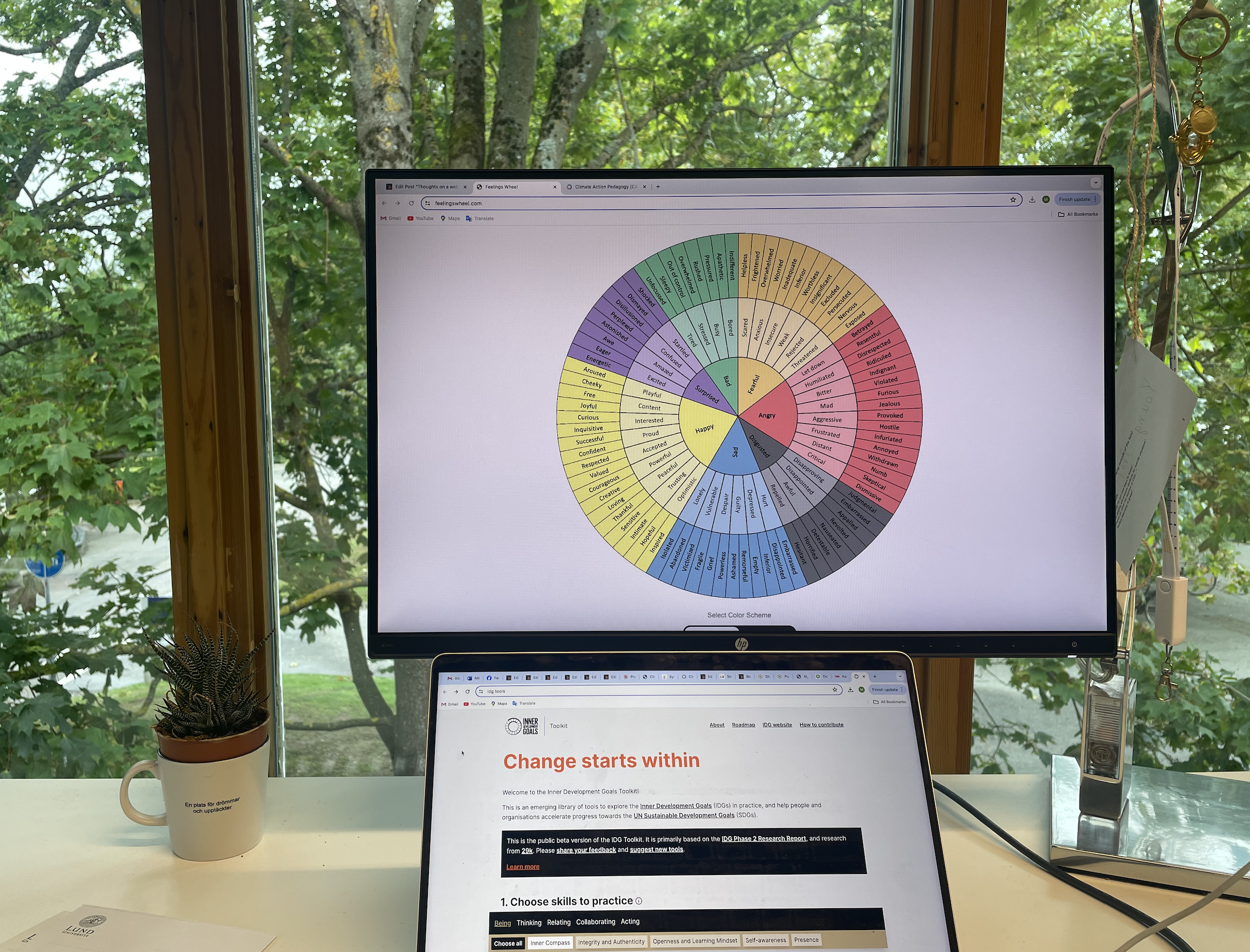
Thoughts on a webinar on “Climate Action Pedagogy (CAP): Working with Sustainable and Inner Development Goals” by Karen Costa
Since on one of her first slides (and here is a link to the slides that contains links to all resources mentioned below, too) last night, Karen Costa invited participants to engage and share resources via all kinds of channels (in the chat, backchannel, tweets, posts, during the webinar and folks watching the recording — I love an explicit call to action like that!), here are the points and resources that I want to remember and that might be useful for you, too!
First: I want to make it very clear that I am just sharing resources that Karen Costa shared in her webinar last night, and some thoughts of my own, but all credit goes to her (and all errors are mine ;-)). I have loved Karen’s work for a while now (see my reflexions on podcasts with her on trauma-aware pedagogy and figuring out ones own Scope of Practice) and was bummed when a workshop last year that I was planning to attend was cancelled, so now I was super excited to get at least a 90 minute crash course!
Now. The absolutely mainest main point of the webinar was that “all courses are climate courses” (the tag line of Climate Action Pedgogy (CAP)) and “all jobs are climate jobs”. There is no one specific correct way to do climate activism, and my activism does not have to look like anyone else’s, I can do my part exactly where I am. She shared how she first pondered what it would look like if faculty development was a climate job, and how that led to developing things like the webinar last night, and I can very much relate to that. At some point I decided that everything I do has to be with the goal of contributing to a sustainable future, and that has shaped my teaching, and reading, and blogging, and the kind of discussions I have.
Another thing that came up over and over again in different contexts was the call to “start naming, start claiming!”. This was mostly applied to the SDGs and IDGs (more on that below), but also to emotions (and Karen shared a very useful tool for that: The “feelings wheel” which you see in the featured image above).
For SDGs and IDGs, which were the main focus of the webinar, Karen shared templates to help figure out which goals people might already be addressing in their teaching without being explicit about it, and which ones they might want to develop more (see links to templates in the slides). I am not entirely sure how I stand on that. I am not a super huuuuge fan of the SDGs because I feel that they are not far-reaching enough and that they are often misused as a checklist, where people just check boxes without actually thinking about what it would mean to take them seriously, and definitely not thinking about competency development or how the goals are actually necessarily interrelated. On the other hand, any step in the right direction is better than none. And then we also know that those goals haven’t had a huge impact and there hasn’t been a lot of progress on them, which is why the IDGs were developed. And I agree that we cannot have sustainability without inner development, but then again, I am not sure how helpful it is to check boxes without thinking about the complexity and interconnectedness of competencies. But it is definitely good to at least raise awareness, and we do have to start from somewhere, and one helpful tool to get ideas for what to do about inner development is this website.
What I loved about the webinar was also watching how it was done. It was only 90(ish) minutes, but packed full with content, invitations to reflect on your own, but also opportunities for interaction and community building. I loved how well prepared it was in terms of constantly putting links to resources into the chat, but especially how explicit Karen was with that everything is an invitation and needs adaptation to everybody’s individual context. Both in terms of the resources she was sharing and nudges she was giving, but also how to use the webinar itself, how to adapt it to the specific needs at that very time (choose whether you want the camera on, whether you want to interact or not, whether to reflect and observe or try the tools she’s presenting). She was also explicit about people being invited to be novices or experts, or everything in between, or oscillating between both, and about inviting people to show up as their whole human self. Even though I chose to stay invisible to the group (or maybe especially because I felt welcome to do it), I really appreciated it very much!
As a result of the webinar, I just signed up for a Climate Change Action course starting soon, and I will check out the CAP design challenge on OneHE (where, as we were told explicitly, there is a 10-day free trial). I will report on that, and encourage you to also check out all the resources!
P.S.: See the time turner hanging from my desk lamp? How I wish I could figure out how to make that work…
creazione dell'account binance says:
Thanks for sharing. I read many of your blog posts, cool, your blog is very good.